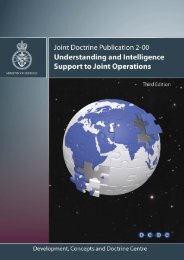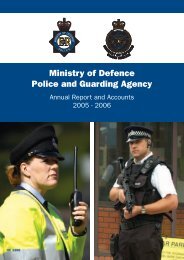JSP 464 - Ministry of Defence
JSP 464 - Ministry of Defence
JSP 464 - Ministry of Defence
You also want an ePaper? Increase the reach of your titles
YUMPU automatically turns print PDFs into web optimized ePapers that Google loves.
SERIOUSLY INJURED LIVING ACCOMMODATION POLICY<br />
Introduction<br />
As at 13 Jul 12 3F - 1<br />
ANNEX F TO<br />
CHAPTER 3<br />
1. This policy provides the framework for the provision <strong>of</strong> suitable MOD Living<br />
Accommodation for seriously injured Service personnel following operational / non<br />
operational activities in order to meet their existing conditions <strong>of</strong> service through out their<br />
remaining service until discharged. All injured Service personnel will follow a designated<br />
Patient Care Pathway, although not all personnel leave medical care as fully fit and return<br />
back to their Units, some are discharged from the Services (taking into account that this<br />
may be some time post hospital/rehabilitation care), or they may enter a transitional<br />
medical care programme at Unit level before discharge/retention is considered. The policy<br />
addresses the cases where adaptations are required for those Service personnel who<br />
continue to be routinely employed by the Armed Forces. While injured personnel continue<br />
to be retained by the Armed Forces, it must be sufficiently flexible to cater for individuals<br />
needs whether just for a transitional period whilst recovering, or permanently. It sets out<br />
the basic entitlements and responsibility for associated costs.<br />
Medical Procedures<br />
2. Responsibility and costs for the medical care <strong>of</strong> all Regular personnel whilst in the<br />
Armed Forces lies with the <strong>Defence</strong> Medical Services (DMS), and not the National Health<br />
Services (NHS), with some provision delivered through NHS / DMS partnering<br />
arrangements.<br />
3. Under the circumstances where Personnel return injured from deployment, for the<br />
majority, medical treatment is provided at RCDM Birmingham. Others injured on non–<br />
operational activities could be treated locally depending upon the circumstances. Once<br />
the acute condition has been stabilised, most seriously injured personnel from either group<br />
will probably receive further care and rehabilitation at DMRC Headley Court which is<br />
centrally funded by MOD. This includes Occupational Therapist’s assessments for their<br />
home environment.<br />
4. Part <strong>of</strong> the assessment process, that takes place prior to the discharge <strong>of</strong> a patient<br />
back to their Unit, will define the ongoing levels <strong>of</strong> support required. Where there is a<br />
requirement for adaptations to living accommodation, costs will be met by the relevant<br />
TLB. The exception to this will be where a medical discharge date is <strong>of</strong>fered, whereupon<br />
the relevant PCT will be responsible to fund adaptation costs from the individuals last day<br />
<strong>of</strong> service. However, until the Medical Board has made that decision, it remains the<br />
responsibility <strong>of</strong> the TLBs to fund the interim provision.<br />
Accommodation Policy<br />
5. Single personnel. For injured single personnel with low level disabilities, SLA should<br />
firstly be considered for suitability and utilised wherever reasonable adaptations, where<br />
required, can be made.


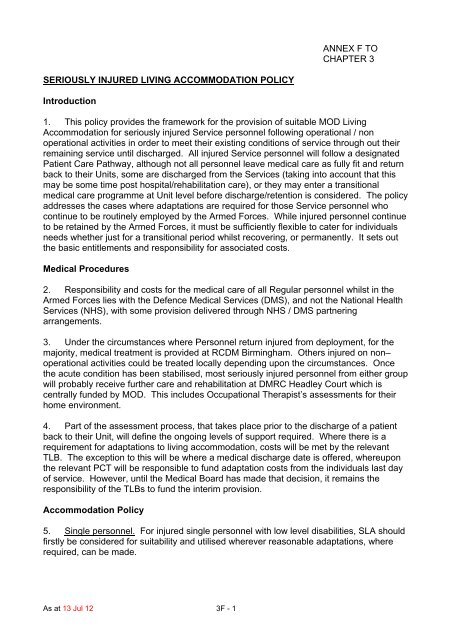
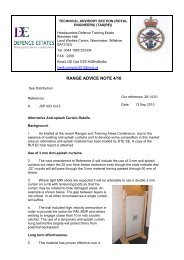

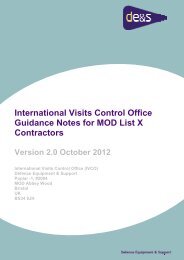
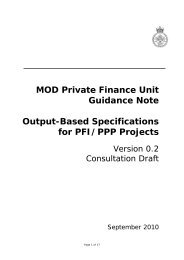

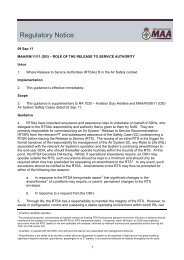
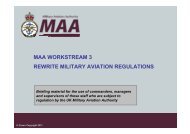
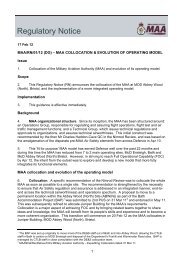
![MAA Regulatory Publications - FAQs PDF [37.3 KB]](https://img.yumpu.com/5906104/1/184x260/maa-regulatory-publications-faqs-pdf-373-kb.jpg?quality=85)
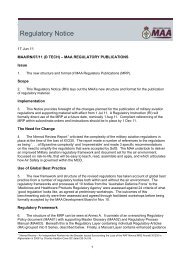
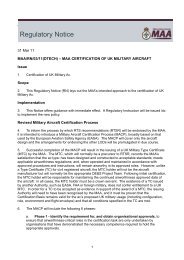
![3750 edition 6 PDF [263.5 KB] - Ministry of Defence](https://img.yumpu.com/5901071/1/184x260/3750-edition-6-pdf-2635-kb-ministry-of-defence.jpg?quality=85)
